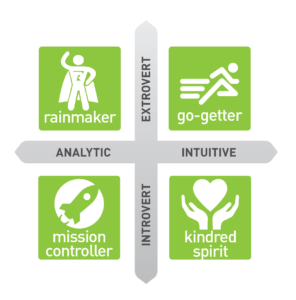Much has now been written about the power and importance of introverts, and yet it’s amazing how often we introverted fundraisers are mismanaged and devalued.
The stories I’ve heard are legion. Many of my fellow fundraisers have complained that their bosses tell them they’re not social enough or chatty enough. That they need to be more assertive. That they should use the phone more often
 And the managers, executive directors, and board members I coach constantly show less enthusiasm for the more introverted fundraisers under their supervision. I spend a good deal of time helping them see the value in their employees.
And the managers, executive directors, and board members I coach constantly show less enthusiasm for the more introverted fundraisers under their supervision. I spend a good deal of time helping them see the value in their employees.
Research supports this bias. It has been proven that as you go up the management ladder, there are fewer and fewer introverts. Why is that? It can’t be about smarts or talent as there’s no evidence we’re not as smart or we’re less talented than our extroverted counterparts.
Perhaps there are reasons of ambition and preference. Perhaps we’re less willing to play the game. I have no idea whether there’s proof of that (just personal experience).
It has been proven that a significant amount of the lack of introverts at the top is due to bias, misunderstanding, and mismanagement. Either their performance is being devalued OR they are being mismanaged and that mismanagement keeps them from doing their best work and advancing. Or both.
We devalue and mismanage our introverted fundraisers at our industry’s peril. It is already a challenge finding experienced fundraisers without discounting half the field. So, I implore you to see our strengths and support us thoughtfully.
When I say “you,” I am speaking primarily to extroverts managing us introverts, but also to introverted managers who might not realize they have biases as well.
Here are four ways to better manage us:
Take the Time to Understand Us
If you don’t understand the critical dichotomy of introversion/extroversion, take the time to learn what it is… and what it isn’t. Misunderstanding #1 is that we’re unsocial. Not true. We just socialize differently and in different quantities. We think to talk, which means you might have to pause to hear our answers. We dig deeper in ourselves and our memories for answers, so you might get longer, more complex answers to your questions. And on and on.
Use the Asking Styles to Understand How We All Interact
Have everyone on your team take the Asking Styles Quiz. Once you know your Style relative to the introverts on your team, you’ll better understand what your introverts bring to the table, how you complement each other, and how you might challenge each other. Use a current donor to talk about the role each of you can plan in cultivating and soliciting them. Perhaps take a stab at the donor’s Asking Style to get an even fuller picture.

Celebrate and Focus on Our Great Strengths
We might hate events, but if you assign us to individual people to cultivate at an event, we can do that really well. We’re also great on details, especially the analytic introverts (what we call Mission Controllers), so use us for the planning and execution of the events where possible. We might dislike the phone, but we’ll write amazing emails and letters. And for every donor who might like a call, there’s another who would prefer something in writing (like me!).
Make Sure Our Opinions are Heard
Don’t take our silence as an indication we have nothing to say. I virtually never speak up in a large group. I rarely insert my opinion when everyone else is talking. I’m much more likely to reach out after a meeting to share something, or to share it in a one-on-one setting.
Have you ever noticed how, after everyone else has been chatting for a while, there’s a moment of silence and the one who hadn’t spoken chimes in? Or the group facilitator asks if anyone else has something to say and someone adds something. That’s probably an introvert.
Or how about when you’re on a Zoom meeting and someone is patiently waiting with their virtual hand up while others chime in without waiting? That’s an introvert.
You miss hearing what we say to your disadvantage but, equally importantly, you devalue us by not making sure our perspective is included.
So, managers of introverts, I hope you’ll embrace us introverts for all our great qualities, and understand that different is simply different. We’ve got so much to bring to the table.
